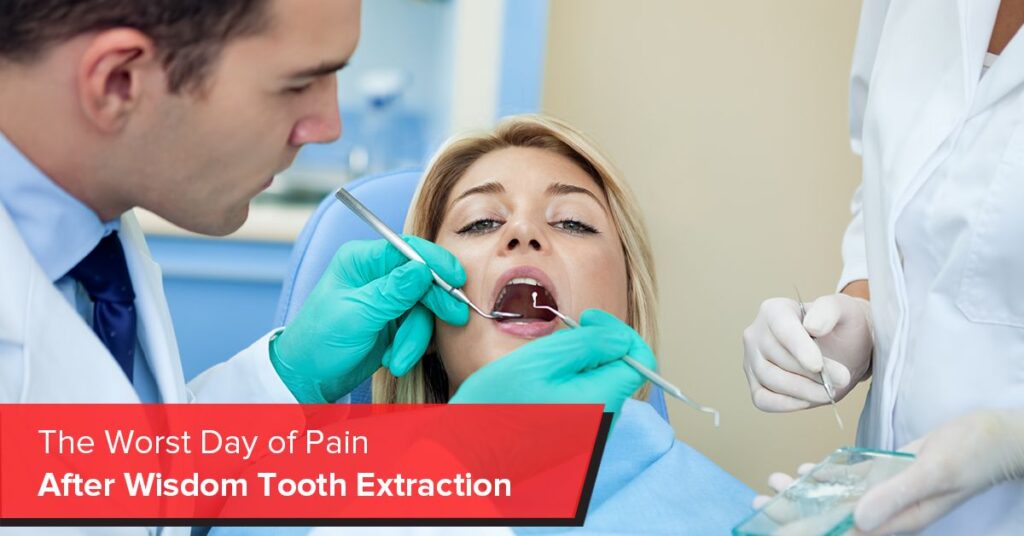Oct
The Worst Day of Pain After Wisdom Tooth Extraction

Undergoing dental surgery, especially wisdom tooth extraction, can feel quite overwhelming. It’s natural to have a lot of questions and concerns before committing to the procedure. That’s why we’re here to help you as we are providing clear answers and guiding you every step of the way.
In this blog post, we’ll address the most common questions about wisdom tooth removal, helping you understand what to expect and how to prepare. With the right information, you’ll be able to approach the treatment with confidence and peace of mind.
So, which day is the hardest after wisdom tooth removal?
For most people, the peak of pain tends to hit on the second or third day post-surgery. The first day is usually a bit of a blur as you’re still feeling the effects of anesthesia or pain meds. But by day two or three, that swelling and inflammation really kick in, and that’s when the discomfort can become quite noticeable. If you find that the pain is getting worse after this point, it might be a sign that something’s not quite right.
Why does the pain seem to ramp up on day two or three?
After your teeth are taken out, your body kicks into healing mode, which means more blood flow to the area, leading to swelling and sensitivity. The nerve endings around the extraction site become more active, and without the anesthesia, the pain can really stand out. This inflammatory response is a normal part of healing, but it can definitely feel uncomfortable when it’s at its peak.
How long can you expect the pain to last after wisdom tooth extraction?
Typically, the pain lasts about three to five days, with most people starting to feel better by day four. You might still have some mild discomfort or sensitivity hanging around for up to two weeks, especially if the extraction was a bit tricky. Healing times can vary based on how many teeth were taken out and how impacted they were.
What are some signs that the pain might be a cause for concern?
If your pain gets worse instead of better after the third or fourth day, it could be a sign of an issue like dry socket. This occurs when the blood clot that forms in the socket either gets dislodged or doesn’t form properly, leaving nerves and bone exposed. Other red flags to watch for include intense throbbing pain that radiates to your ear or jaw, a bad smell, pus, or even a fever. If you notice any of these symptoms, it’s a good idea to reach out to your dentist.
Does everyone feel pain the same way?
Not at all! Pain tolerance and recovery experiences can really differ from one person to another. Some people only experience a bit of discomfort, while others could find the pain quite intense. Your age, the tooth’s impaction, and overall health can all play a role in how much pain you feel.
Can eating make the pain worse?
If you consume hard and chewy or hot foods too soon after surgery, they can irritate the extraction site and exacerbate the pain. To prevent the area from getting aggravated, it’s a good idea to stick to soft, cool foods like yogurt, smoothies, mashed potatoes, or soup (just make sure it’s not too hot) for the first few days.
Is it normal to feel pain on just one side?
Yes, if you had a tooth taken out from only one side of your mouth, it’s completely normal for the pain to be concentrated there. Even if you had multiple teeth removed, the pain might feel more intense on one side depending on how tricky the extraction was.
Can stress or anxiety make the pain feel worse?
Stress and anxiety can really amplify your body’s sensitivity to pain. If you’re feeling anxious about your recovery, it might make normal discomfort seem even more intense. Try to take it easy, stay calm, and stick to your dentist’s care instructions for a smoother healing process.
When should I start to feel a lot better?
Most people notice a significant improvement by the fourth or fifth day. The swelling usually starts to go down, and pain levels typically drop. While you might still feel some tenderness for a week or two, it shouldn’t really get in the way of eating or talking.
